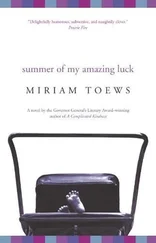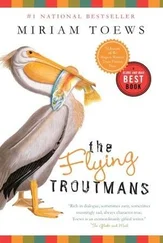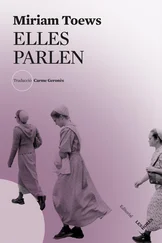We’ll watch her, said Noehmi.
Are you sure? I said. She’s extremely violent.
Absolutely! said Noehmi. We’ll be right here. We’re not going anywhere until there’s a recount and Obrador wins. This is a peaceful protest, so Ximena will learn passive resistance from us.
I made another bottle for Ximena and gave it to Noehmi, just in case.
Can I ask you a quick question before you go? said Noehmi.
Sure, I said.
What was that language you were speaking with your sister? said Noehmi.
It’s called Plattdeutsch, I said. It’s like German, I guess. And we sometimes speak English and sometimes Spanish.
It sounds medieval to me, said Noehmi.
Yeah, I guess, I said.
What’s your favourite? said Noehmi.
I don’t know, I said.
English? said Noehmi.
I like it but Aggie doesn’t know it very well.
What language do you dream in? said Noehmi.
English and Spanish, I said. Never Plattdeutsch.
Maybe that’s because English and Spanish were the languages you learned secretly when you weren’t supposed to, said Noehmi.
Is that what dreams are? I said.
I don’t know, said Noehmi. She laughed. Nobody knows. Have you heard of lucid dreaming?
No, I said.
I’m reading this book called … And Other Problems in Waking Life , she said.
Other problems besides what? I said.
Sadness, loneliness, anxiety, depression, fear, despair, numbness, alienation, anger, heartbreak, she said.
Are there more? I said.
Maybe, she said.
Oh no, I said. And then, for some reason, I began to ramble on about languages, this torrential speech that had maybe been gestating inside of me for an unnaturally long time. I think Spanish is my favourite, I said. I told her that I had been born in Canada and started off speaking Plattdeutsch and then I went to school and learned English and loved it and never spoke Plattdeutsch if I could help it except with my dad who insisted on it. I told her that after school, if my dad was out, I’d teach my mom English words like hula hoop and keep on trucking . I told her I had a sister, Katie, and that we had whispered together all night long in English like other kids sneak smokes. I told her that when I was thirteen we moved to Mexico, to Chihuahua, and I started to learn Spanish even though my father had disapproved of that too.
Why? said Noehmi.
Girls weren’t supposed to, I said.
Why? said Noehmi.
I don’t know, I said. The usual reasons.
And then I told her that I was married to a Mexican guy and she said you are not!
I am, I said. But he left me.
And that’s why you came to Mexico City? she said.
Sort of, I said. Noehmi looked closely at Ximena.
She doesn’t look very Mexican, she said. But I guess she took after you. Do you share custody with your husband?
No, I said.
He doesn’t want to see his kid? she said.
Well … actually, I said, Ximena isn’t his kid.
Ahhh, said Noehmi. She smiled. She nodded her head as the universe revealed itself.
No, it’s not that, I said. She’s not my kid, either. She’s my sister.
Really? said Noehmi. Why do you have her?
I don’t know, I said.
Did your parents die? said Noehmi.
No, I said. I was beginning to understand something I couldn’t articulate. It was a jazzy feeling in my chest, a fluttering, a kind of buzzing in my brain. Warmth. Life. The circulation of blood. Sanguinity. I don’t know. I understood the enormous risk of telling the truth, how the telling could result in every level of hell reigning down on you, your skin scorched to the bone and then bone to ash and then nothing but a lingering odour of shame and decomposition, but now I was also beginning to understand the new and alien feeling of taking the risk and having the person on the other end of the telling, the listener, say:
Bad shit at home? You guys are running away?
Yeah, I said.
I understand, said Noehmi.

I wandered around the Zócalo looking for Aggie. I was a little nervous and also a bit relieved about the three of us being separated for the first time since our exodus. My arms were sore from holding Ximena and carrying stuff and I tried to drop my shoulders and shake out my stiffness and appear somewhat confident. I scanned the crowd but no Aggie. I headed towards the National Palace. It took me quite a long time to get to it because I had to meander around clumps of people and food stands and dancers and noisemakers and kids playing and mothers nursing babies and teenagers smoking cigarettes and old men and dogs and laughing families and praying nuns and choirs and pigeons and tarps and giant banners and unicycles and gladiators and boxers and soccer players. I saw a guy who looked exactly like Jorge and I stopped dead in my tracks, as they say, and panicked a little. It wasn’t him and I didn’t know if that made me feel happy or sad. Eventually it started to rain, gently at first and then hard. It felt good. People took out pieces of cardboard and garbage bags to protect themselves. I finally made it to the National Palace and went inside and there was Aggie staring at a massive mural. She was crying. I walked over to her and put my arm around her shoulders.
What’s wrong, Aggie? I whispered.
She shook her head.
Are you afraid? I said.
No, she said.
I didn’t know what to say or how to make her stop crying. I hugged her. I had forgotten how skinny she was.
Look at that, said Aggie.
The picture? I said.
It’s called México a través de los siglos, she said.
It’s making you sad? I said.
No, she said. Her face was covered in snot and she spoke in the spaces between her sobs.
I didn’t know that a grown-up could do that, she said. She pointed at the mural. I didn’t know that a person could do that.
I stared at it with her. She was in some kind of trance. Finally she asked me where Ximena was and I told her about Noehmi and that we should probably get back to her. If I had known more about anything I might have pointed out how Diego Rivera was asking all Mexicans to look squarely at the history of their lives, at the beauty and the misery and the pain and the struggle and the wreckage created by that profligate Cortés. I could have added too that Diego Rivera was completing his mural around the time the seven Mennonite men came to the palace to ask for the land in Chihuahua, now the scabby homeland of Aggie, Ximena and Pancho Villa, and how Mennonites always choose to live in places nobody else wants to.
Can we come back? said Aggie.
Of course! I said. As often as you like.
We snaked our way through the crowd and found Noehmi huddled under a lean- to made of garbage bags and using a flashlight to read her book ‖ And Other Problems in Waking Life . Ximena was fast asleep under Noehmi’s baggy sweater. Noehmi rested her chin on Ximena’s head while she read. There were fireworks going off in the rain. People were banging on pots again and there was sporadic shouting coming from all over the square. We crawled under the lean- to and sat down next to Noehmi and Ximena.
How was she? I said.
Perfection, said Noehmi.
Did she cry a lot? I said.
No, said Noehmi, hardly at all. I sang Jonathan Richman songs to her.
Who’s that? said Aggie.
My hero, said Noehmi. He’s old, like sixty or something, and he still loves the world and when you listen to his music he makes you love it too.
A guy walked past and said something about a blow job to Noehmi.
Go fuck yourself with Hitler’s dick, said Noehmi happily. Are you guys hungry?
Noehmi’s friends weren’t there at that moment but they had cooked up some kind of meat with onions and peppers on a small barbecue they’d brought with them to the square. There are tortillas in that basket over there, she said.
Читать дальше













